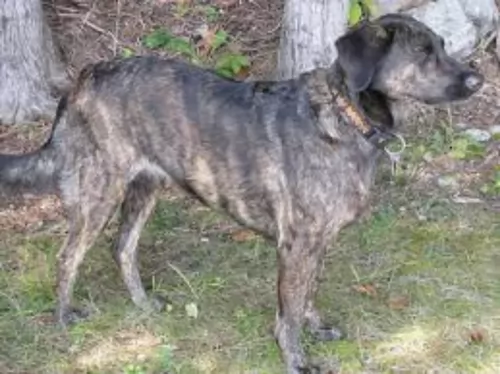 Petzlover
PetzloverEnglish White Terrier is originated from United Kingdom but Treeing Tennessee Brindle is originated from United States. English White Terrier may grow 15 cm / 5 inches shorter than Treeing Tennessee Brindle. English White Terrier may weigh 14 kg / 30 pounds lesser than Treeing Tennessee Brindle. English White Terrier may live 4 years less than Treeing Tennessee Brindle. English White Terrier may have more litter size than Treeing Tennessee Brindle. English White Terrier requires Moderate Maintenance. But Treeing Tennessee Brindle requires Low Maintenance
The English White Terrier was developed in the 1860’s by a group of breeders from the Sealyham terriers, the Jack Russell terrier, and the Fox Terrier. These breeders were looking for a white terrier that could be more successful in the show ring than the current prick-eared English terrier. They named their new breed, the English White Terrier or the Old English terrier. In later years in the United States, the English White Terrier was mixed again with the Rat Terrier and the Old English Bulldog to create both the Boston terrier and the Bull terrier.
Although the breed did not last long it did have a prestigious ancestry that could be traced back centuries in England among ancient terriers. The word terrier was in use in England in 1440, showing that the dogs were well known at that time. Most historians agree that the dogs were even older than the 1400’s. It is believed that terriers who “went to ground” after prey, existed as far back as the time of Christ in England.
Most of these ancestors of the English White Terrier were not white. White terriers came onto the scene around the 1700’s.The first picture of white terriers appeared in 1790 when Sawre Gilpin, a British artist, painted “A Huntsman with Hounds Foxhunting” and the terriers in the painting were white with brown marks. Others began to show the same kind of terriers in their artwork – white coated. Before this it is believed that breeders killed the white terriers at birth because they were often deaf and inferior to the other terriers. In the early part of the 19th century, the white terrier began to be completely white with no markings. The Kennel Club recognized them in 1874 as the White English Terrier.
The breed faced many genetic issues, deafness and the Kennel Clubs felt there was no difference between the current White English terrier and the English White terrier despite the difference in their ears. The new English White Terrier had dropped ears instead of Prick-ears. They considered them to be the same breed and not even different types. They were the smallest of all terriers and considered to be a good pet but not a show dog or a working dog. Because of this it was not very popular, and it actually had been bred to be a show dog and not a working dog. The English White Terrier was not recognized by any Kennel Club and within 30 years it was extinct.
 There doesn’t seem to be 100% clarity on how the dog came about but it originated in USA. It appears as though it was only since 1995 that records have been maintained through the American Kennel Club's Foundation Stock Service Program.
There doesn’t seem to be 100% clarity on how the dog came about but it originated in USA. It appears as though it was only since 1995 that records have been maintained through the American Kennel Club's Foundation Stock Service Program.
A Reverend Earl Phillips, who was a writer for a hunting magazine became aware of a Brindle Cur with a brown coat and tiger stripes. In fact ‘treeing’ is a type of hunting, where the dog chases an animal into a tree to escape. He heard about the dog’s amazing hunting skills.
In the early 1960s, he later formed The Treeing Tennessee Brindle Breeders Association, designed to protect the breed. It was in 2013 that the dog got foundation stock status with the American Kennel Club, but isn’t registered with the American Kennel Club.
The English White Terrier had a pure white coat with no markings of any kind. His coat was short, hard, and glossy and his body was firm, muscular and hard. The breed was small – almost a toy. They had a body like the Manchester Terrier. They had long legs and large feet. The tail was medium size and straight out from the body.
The English White Terrier had a very refined head with a fairly long muzzle. Their bite was even, and their eyes were brown, amber or black. Their ears dropped – unlike the pricked ears of the White English Terrier.
 The Treeing Tennessee Brindle is a medium sized, deep chested breed of Cur, descending from the Old Brindle Cur dog.
The Treeing Tennessee Brindle is a medium sized, deep chested breed of Cur, descending from the Old Brindle Cur dog.
These strong dogs have a short, smooth brindle coat that is fairly soft to the touch. The coat's color is a mix of tan, black and a little bit of white.
He stands at between 41 and 61cm in height and weighs between 14 and 23kg both male and female. The Treeing Tennessee Brindle has a loud bark and it is best that this dog lives on a farm or in the suburbs as opposed to living in a small space in the city.
The Treeing Tennessee Brindle is a friendly, social dog and this is why he doesn’t make a particularly good watchdog.
He gets on well with children in the home as well as other dogs, not showing any aggression towards them.
They’re intelligent dogs and it will be a good idea to have them trained and socialized to make them well balanced and well behaved.
The English White Terrier was affectionate and devoted to his family. It was the softest tempered of all terriers and made an excellent pet. Some of the English White Terriers were animal aggressive while others were not. Training was difficult because of the wide-spread deafness in the breed. IT loved to be cuddled and held. They were also tenacious and game for any type of fight or hunt despite their size and deficiencies.
 This brindle-colored cur dog is brave, intelligent and lively and his temperament allows him to be a good companion for his human family.
This brindle-colored cur dog is brave, intelligent and lively and his temperament allows him to be a good companion for his human family.
Even though they are friendly around strangers, they still make good watchdogs and will alert you to all kinds of visitors to your property. They do best in a home with large grounds and an active family where they can explore and sniff around. At the end of the day, they love to lie contentedly at your feet, a loyal, loving companion.
The breed was considered to be unhealthy for the most part and became extinct because of this. Many complained that the breed was inbred and had a weak constitution because of it. Deafness was prevalent throughout the breed. This deafness occurs in many white animals, but the English White Terrier had the highest rates among all white dogs.
 The Treeing Tennessee Brindle is a robust, healthy breed. You’re not likely to battle with too many health issues with him.
The Treeing Tennessee Brindle is a robust, healthy breed. You’re not likely to battle with too many health issues with him.
Watch out for ear infections which are more common in floppy eared dogs. Other common dog diseases that you need to know about -
This is a viral disease which is highly contagious and with no known cure. It’s why there is a vaccine against it. Coughing, lethargy, high temperature and loss of appetite with vomiting are symptoms of this disease.
This is another highly contagious respiratory viral infection transmitted between dogs in close proximity to each other, like in kennels for instance.
Symptoms include coughing, sneezing, nasal discharge, breathing difficulties, lethargy and loss of appetite. It’s important to get veterinary assistance as pneumonia could set in.
It was best to feed the English White Terrier 1-2 cups of dry meal per day served in 2 meals.
As mention previously, the English White Terrier was congenitally deaf and had a weak constitution.
This little dog with all its problems was still a very energetic dog and needed considerable exercise. Owners had to develop exercises and games to keep the English White Terrier occupied as with any terrier. If they didn’t have a job or something to occupy their minds and bodies, they were destructive.
 A brush once or twice a week will be sufficient for this dog. Look inside his ears for signs of redness which could indicate an ear infection. Make sure his eyes are still bright and not red and with a pus discharge. Trim his nails too.
A brush once or twice a week will be sufficient for this dog. Look inside his ears for signs of redness which could indicate an ear infection. Make sure his eyes are still bright and not red and with a pus discharge. Trim his nails too.
The Treeing Tennessee Brindle is a high energy dog and he is going o want more than just a walk every day, although he will love that and rely on you for this daily outing.
He will also want ball games and hide and seek games.The breed needs an active owner who will take him on long walks and hikes.
Whenever you opt to give a dog commercially manufactured dog food, you need to check that the dog food is made with high-quality ingredients which are mostly made up of protein or meat.
Certainly a puppy will need protein in his food for proper growth and he will require 4 bowls of food a day. An adult dog will require 2 bowls of food a day.
The type of commercial dog food you buy will depend on the age of your dog as well as his activity levels. If your dog has a known allergy or illness, there are dog foods manufactured with that in mind.
Try and in include some homemade food into his diet. Nothing spicey and exotic as this can cause stomach problems. A good guide is boiled chicken, brown rice and vegetables.